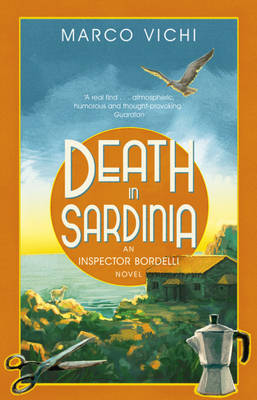
EURO CRIME
Reviews

Vichi, Marco - 'Death in Sardinia' (translated by Stephen Sartarelli)
Paperback: 464 pages (Oct. 2012) Publisher: Hodder & Stoughton ISBN: 1444712276
DEATH IN SARDINIA is a lengthy book set in Florence in the 1960s that features an ageing detective, Inspector Bordelli. Five years away from retirement, he has seen much and has his own individual approach towards dealing with criminals, including inviting a persistent offender, Ennio, round to his house to cook the Christmas dinner for Bordelli and (similarly aged) friends. Fortunately, one of Ennio's prison stints was in a French jail, allowing him to cook a French themed dinner for the Inspector. One of many side stories in the book, this small glimpse of Bordelli's life gives a taste of the style of the whole of the book. Bordelli has a general liking for food and wine, a persistent battle with restricting his cigarette count, and a rich set of acquaintances, friends and criminal associates.
Of course part of the book is set around solving crime, and in fact there are two main crimes to solve. In one, an avaricious moneylender is murdered, probably by one of his 'clients' and his apartment has been thoroughly searched. But it's Bordelli who in the end discovers the hidden cache that the murderer had been looking for and with that a possible motive. The other crime is the apparent suicide of a man in Sardinia (hence the title of the book), which is investigated by Bordelli's colleague, Piras. Piras is on sick leave, back at home with his family, while he recovers from being shot at during a shoot-out. The murdered man is a lone farmer who'd been discussing selling part of his land for development. Eventually, of course, both crimes are solved and the appropriate punishment meted out.
But much of the book is a series of stories, many of which are recollections of past events, particularly in the war, including Bordelli's own contribution to fighting the fascists. And of course, it is these past events that in one way, or another, have resulted in the two major crimes being investigated by Bordelli and Piras.
There is a wonderful flavour of Italy, history and culture, in the book, and some insight into how a country was keen to put the past behind it and move on after the war, even allowing fascist war criminals to escape punishment with barely a thought. Bordelli is a wise, somewhat eccentric character who follows the code enunciated by a dying colleague Baragli 'above all, a policeman must be fair'. At the end of the book, he recounts asking the question 'what do we live for' with the reply he remembers from an old friend back in 1944, where he says he doesn't know but 'he likes living'. And that sums the book up, beautifully translated by Stephen Sarterelli: it's a book about living, events, crimes and stories, featuring an Inspector that clearly enjoys life. It is a real pleasure to read.
Read another review of DEATH IN SARDINIA.
Michelle Peckham, England
April 2013
Details of the author's other books with links to reviews can be found on the Books page.
More European crime fiction reviews can be found on the Reviews page.